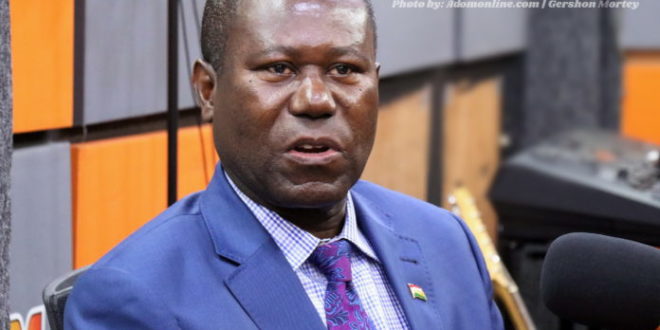Ghana Cocoa Board (COCOBOD) on Tuesday unveiled the $600-million cocoa syndicated loan facility to revamp the West African country’s cocoa sector.
The COCOBOD loan was pooled by a consortium of development finance institutions namely the African Development Bank (AfDB), Japan International Cooperation Agency (JICA) and the Development Bank of South Africa (DBSA).
Other contributing institutions are Cassa Depositi e Prestiti Spa (CDP) of Italy, Credit Suisse AG and the Industrial and Commercial Bank of China Limited (ICBC).
Due to the Coronavirus pandemic’s effects on global travel, some representatives of the consortium had to join the ceremony virtually.
Officials disclosed that an initial $200 million out of the $600-million credit facility has already been disbursed.
COCOBOD Chief Executive, Joseph Boahen Aidoo, assured the public that the loan would be used solely for its intended purpose.
Now, this is how COCOBOD intends spending the $600-million syndicated loan it has successfully procured.
1. Fight Against Swollen Shoot Disease (CSSVD)
COCOBOD made it public at the signing of the syndicated loan November last year, that $140 million of the amount would be voted to fighting CSSVD.
The world number two top producer of cocoa beans has been battling the incidence of Cocoa Swollen Shoot Virus Disease (CSSVD) in its Eastern and Western cocoa regions. Experts have said the disease is partly to blame for dwindling harvests leading to a downward review of crop projections this year.
This, coupled with other reasons, led the board to initiate the cocoa farm rehabilitation projects part of the wider Productivity Enhancement Programmes (PEPs) to increase yield per hectare to at least 1,000 kilogrammes.
“For the 2019/20 crop year, we started with some 37,850 hectares of diseased farms in both regions. Large proportions of the affected farms are presently at various stages of rehabilitation. It is only a matter of time before they become productive again,” Mr Boahen Aido reported.
Still, under the Productivity Enhancement Programmes (PEPs), $40 million would be invested in irrigation services and $68 million on expanding COCOBOD’s hand pollination initiative.
2. Investing COCOBOD Loan In Warehousing Capacity
An increment in crop yield from the current 350-400kg per hectare to anywhere near the expected 1,000 kg would certainly create a huge demand for more temporary storage space – warehouses.
In keeping with its bigger plan, COCOBOD says it will invest some $50 million of the credit facility in infrastructure building to increase its warehousing capacity across the seven cocoa-growing regions.
3. Meeting The 50% Local Cocoa Processing Goal
The government of Ghana in 2017 set itself the target of processing locally up to 50% of the nation’s cocoa produce by the year 2022.
The current local processing level is estimated at around 30% of annual crop production. And according to the Oxford Business Group, Ghana’s processing activities have increased by 69.1% to 225,000 metric tonnes during the last five crop seasons. In spite of the modest progress, the status quo remains that about 70% of produce is exported in the raw form.
Committed to changing the narrative, the Ghana Cocoa Board says it will inject $200 million of the loan amount to promote the domestic processing of cocoa. Not much has been said about the implementation strategy of this visionary intention.
Perhaps the amount may be invested in expanding the capacities of current processing companies, notable among them the government-owned Cocoa Processing Company (CPC), WAMCO, Olam, Niche Cocoa, Barry Callebaut, BD Associates and Cargill.
There also has been a steady emergence of an Artisanal cocoa processing industry in Ghana in recent time, that seems to be catching the attention of COCOBOD, and hopes are that some funds will be invested in growing that sector into the value chain.
Last March, after a visit to the Board by an AfDB delegation, COCOBOD spokesperson Mr Fiifi Boafo intimated that “the wish of Cocobod, government, and Ghana as a country to get funding support for entrepreneurs at different levels to go into processing, and also artisanal chocolate manufacturing.”
All efforts are to culminate in Ghana earning more from processed and value-added cocoa products, rather than sell the raw beans.
4. Building A Domestic Consumption Culture
Switzerland, which imports cocoa from Ghana and other countries, is the world’s leading consumer nation of chocolate (processed cocoa) per capita. It’s citizens consumer 9kg of chocolate per person per year.
Regrettably, the second-largest cocoa-producer nation, Ghana, boasts of a paltry 0.52kg cocoa consumption per capita. COCOBOD believes investing $7.5 million of the $600-million cocoa syndicated loan to promote domestic consumption of cocoa products can turn the situation around.
5. COCOBOD Loan For Cocoa Farmer Database
$10.6 million of the COCOBOD loan is planned to be spent in establishing a database of all cocoa farmers in the country. Sources say a national programme to survey and map all cocoa farms is already underway.
The information gathered is to be combined with the Cocoa Health and Extension Division (CHED) growing database of cocoa farmers and farmer cooperatives, which stood at 101,796 and 512 respectively in July 2019.
A consolidated database of farmers and farms is hoped to help the regulatory body effectively manage and offer the needed services to players in the cocoa value chain as part of COCOBOD’s transformation agenda.
COCOBOD says “the funds will be applied to strengthen the local cocoa industry” cutting across the entire domestic value chain from beans production to processing.
“This will in turn aid the cocoa authority in its effort to achieve SDG Goals 1 (no poverty), 8 (decent work and economic growth) and 12 (responsible consumption and production)”, partly noted a COCOBOD statement ahead of the launch ceremony of the 600-million dollar syndicated facility.
Source: thecocoapost.com
 Home Of Ghana News Ghana News, Entertainment And More
Home Of Ghana News Ghana News, Entertainment And More






